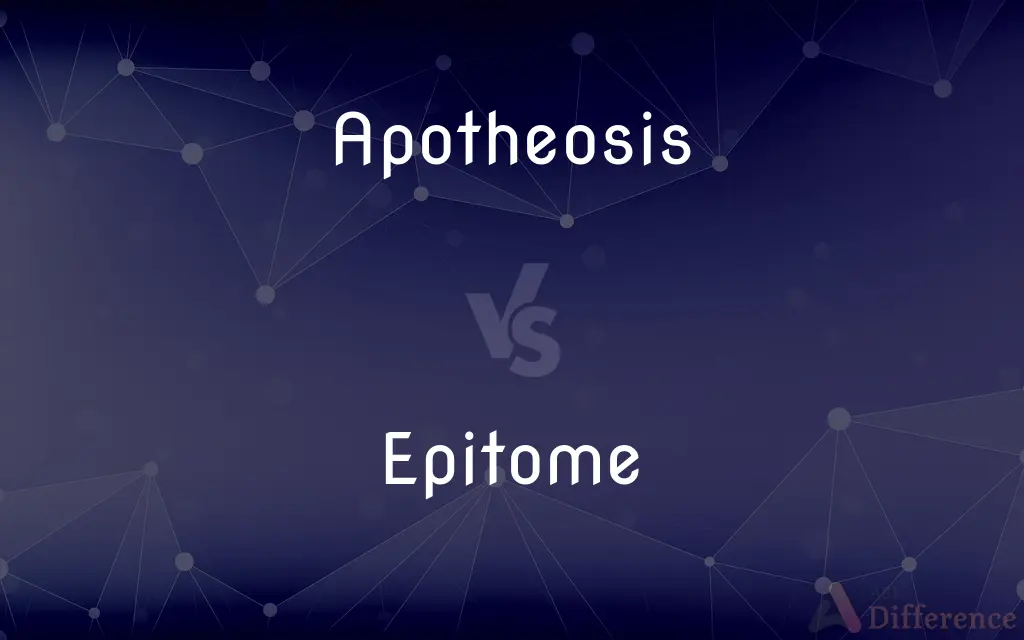Apotheosis vs. Epitome — What's the Difference?
By Fiza Rafique & Urooj Arif — Updated on April 6, 2024
Apotheosis refers to the elevation of someone to divine status; epitome means a perfect example of a particular quality or type.

Difference Between Apotheosis and Epitome
Table of Contents
ADVERTISEMENT
Key Differences
Apotheosis often signifies the highest point of glorification or elevation, frequently associated with divinity or perfection. This term is commonly used in literature and history to describe a person or entity being raised to godlike stature or an ideal state of perfection. It embodies the notion of ultimate enhancement or elevation, going beyond mere excellence to reach a divine or near-divine status. On the other hand, epitome focuses more on representation. It denotes a person, thing, or instance that perfectly embodies a particular quality, characteristic, or class. The epitome is about being the most fitting example of a category or concept, without necessarily implying elevation to a higher status or divinity.
While apotheosis may denote a transformational process, leading someone or something to become the ultimate embodiment of a certain quality or achieve a godlike status, epitome emphasizes being the quintessence of a particular characteristic right from the outset. Whereas apotheosis is dynamic, suggesting a journey or evolution to a pinnacle of greatness or divinity, epitome is static, representing the highest standard of a quality or type without implying any change or transformation.
Apotheosis often has a broader, more profound impact, suggesting a universal or widespread recognition of an individual's or entity's elevated status. This term can be applied in various contexts, including religious, cultural, and historical, to convey the idea of reaching a peak of excellence or divine status. In contrast, epitome is typically used in more specific contexts to highlight an individual's, object's, or concept's embodiment of a particular quality or characteristic, suggesting precision and specificity in representation.
In cultural and literary contexts, apotheosis can be seen as a narrative device or thematic element that symbolizes the ultimate form of elevation or glorification. It resonates with themes of transcendence, transformation, and the blurring of boundaries between the mortal and the divine. On the other side, epitome is often used to illustrate the essence of traits, ideas, or values within characters, scenarios, or objects, providing a clear, tangible example of abstract qualities or concepts.
The usage of apotheosis and epitome reflects different dimensions of human aspiration and idealization. Apotheosis embodies the aspiration to transcend human limitations and achieve a higher, almost divine status, representing a pinnacle of human achievement or transformation. Conversely, epitome encapsulates the concept of perfection in representation, serving as a benchmark or ideal example within a certain domain or characteristic, without necessarily implying transcendence or elevation beyond the human realm.
ADVERTISEMENT
Comparison Chart
Definition
The elevation of someone to divine status or the highest point of development or glorification.
A perfect example or instance of a particular quality or type.
Context of Use
Often used in religious, mythological, or cultural narratives to denote divinity or supreme status.
Commonly used to describe the most fitting example within a category or characteristic.
Implication of Change
Implies a transformation or elevation to a higher state.
Indicates an existing state of being the perfect example; no transformation implied.
Scope
Broader and more profound, can be abstract and universal.
More specific and tangible, focused on precise qualities or characteristics.
Connection to Divinity
Direct, as it involves elevation to divine status or qualities.
Indirect, focusing on earthly or material perfection without direct reference to divinity.
Compare with Definitions
Apotheosis
Mythological Transformation.
The apotheosis of Hercules involved his acceptance among the gods on Mount Olympus.
Epitome
Ideal Representation.
The novel is considered the epitome of romantic literature.
Apotheosis
Elevation to Divine Status.
In ancient Rome, the apotheosis of a ruler marked his elevation to godhood in the state religion.
Epitome
Quintessence of a Characteristic.
The vintage car was the epitome of 1950s luxury.
Apotheosis
Glorification to a Supreme Level.
The monument was built as the apotheosis of the national hero.
Epitome
Symbol of a Category.
The building is the epitome of modern architecture.
Apotheosis
Figurative Use for Peak Achievements.
The artist's final masterpiece was described as the apotheosis of her artistic journey.
Epitome
Perfect Example of a Quality.
His act of bravery was the epitome of heroism.
Apotheosis
Highest Point of Development.
The scientist's breakthrough was seen as the apotheosis of his career.
Epitome
Embodiment of a Concept.
The new policy is the epitome of sustainable development.
Apotheosis
Apotheosis (Greek: ἀποθέωσις, from ἀποθεόω/ἀποθεῶ, ''to deify''; also called divinization and deification from Latin: deificatio, lit. ''making divine'') is the glorification of a subject to divine levels and commonly, the treatment of a human being, any other living thing, or an abstract idea in the likeness of a deity. The term has meanings in theology, where it refers to a belief, and in art, where it refers to a genre.
Epitome
An epitome (; Greek: ἐπιτομή, from ἐπιτέμνειν epitemnein meaning "to cut short") is a summary or miniature form, or an instance that represents a larger reality, also used as a synonym for embodiment. Epitomacy represents "to the degree of." An abridgment differs from an epitome in that an abridgment is made of selected quotations of a larger work; no new writing is composed, as opposed to the epitome, which is an original summation of a work, at least in part.
Apotheosis
Exaltation to divine rank or stature; deification.
Epitome
A person or thing that is a perfect example of a particular quality or type
She looked the epitome of elegance and good taste
Apotheosis
Elevation to a preeminent or transcendent position; glorification
"tried to attribute Warhol's current apotheosis to the subversive power of artistic vision" (Michiko Kakutani).
Epitome
A summary of a written work; an abstract.
Apotheosis
An exalted or glorified example
Their leader was the apotheosis of courage.
Epitome
A representative or perfect example of a class or type
"He is seen ... as the epitome of the hawkish, right-of-center intellectual" (Paul Kennedy).
Apotheosis
The fact or action of becoming or making into a god; deification.
Epitome
A brief summary, as of a book or article; an abstract.
Apotheosis
Glorification, exaltation; crediting someone or something with extraordinary power or status.
The turn of the century saw the apotheosis of digital technology.
Epitome
The embodiment or encapsulation of a class of items.
Apotheosis
A glorified example or ideal; the apex or pinnacle (of a concept or belief).
Epitome
A representative example.
Apotheosis
The best moment or highest point in the development of something, for example of a life or career; the apex, culmination, or climax (of a development).
The apotheosis of her career was her appointment as chairman.
Epitome
The height; the best; the most vivid.
Apotheosis
(loosely) Release from earthly life, ascension to heaven; death.
Epitome
A brief summary of a text.
Apotheosis
(psychology) The latent entity that mediates between a person's psyche and their thoughts. The id, ego and superego in Freudian Psychology are examples of this.
Epitome
A work in which the contents of a former work are reduced within a smaller space by curtailment and condensation; a brief summary; an abridgement.
[An] epitome of the contents of a very large book.
Apotheosis
The act of elevating a mortal to the rank of, and placing him among, "the gods;" deification.
Epitome
A compact or condensed representation of anything; something possessing conspicuously or to a high degree the qualities of a class.
An epitome of English fashionable life.
A man so various that he seemed to beNot one, but all mankind's epitome.
Apotheosis
Glorification; exaltation.
Epitome
A standard or typical example;
He is the prototype of good breeding
He provided America with an image of the good father
Apotheosis
Model of excellence or perfection of a kind; one having no equal
Epitome
A brief abstract (as of an article or book)
Apotheosis
The elevation of a person (as to the status of a god)
Common Curiosities
Can a person be an epitome?
Yes, a person can be an epitome if they perfectly embody a particular quality or characteristic.
What does apotheosis mean in literature?
In literature, apotheosis refers to a character's elevation to divine status or their reaching the highest point of character development.
How is apotheosis used in mythology?
In mythology, apotheosis often describes the transformation of mortals into gods or their elevation to a divine level.
Can a moment be considered an apotheosis?
Yes, a moment can be considered an apotheosis if it represents the peak of an event or process.
How do you use epitome in a sentence?
"She is the epitome of elegance."
What makes something an epitome?
Being the epitome of something means being the most perfect or typical example of a particular quality or class.
Is apotheosis always religious?
No, apotheosis can be used in secular contexts to denote the highest point of development or glorification of someone or something.
Is epitome always positive?
While often used positively, epitome can be used negatively if it represents a perfect example of undesirable qualities.
What role does epitome play in characterization?
In characterization, the epitome helps to highlight the most defining traits of a character, making them a perfect example of certain qualities.
What's the difference between apotheosis and perfection?
Apotheosis involves elevation to a divine or the utmost status, whereas perfection refers to flawlessness within a particular scope.
Can an object be described as an epitome?
Yes, objects can be described as the epitome if they perfectly represent a specific characteristic or era.
What is the epitome of fashion?
The epitome of fashion would be an outfit or style that perfectly embodies the prevailing or desired trends.
Can apotheosis apply to ideas?
Apotheosis can apply to ideas when they are elevated to the highest status of acceptance or glorification.
How does culture influence the concept of apotheosis?
Cultural beliefs and values shape who or what is considered worthy of apotheosis, influencing the attributes associated with divinity.
Is apotheosis achievable in real life?
While the literal transformation into a deity is not possible, individuals or achievements can be metaphorically elevated to a supreme level of acknowledgment or honor.
Share Your Discovery

Previous Comparison
Thor vs. Tor
Next Comparison
Impossible vs. UnpossibleAuthor Spotlight
Written by
Fiza RafiqueFiza Rafique is a skilled content writer at AskDifference.com, where she meticulously refines and enhances written pieces. Drawing from her vast editorial expertise, Fiza ensures clarity, accuracy, and precision in every article. Passionate about language, she continually seeks to elevate the quality of content for readers worldwide.
Co-written by
Urooj ArifUrooj is a skilled content writer at Ask Difference, known for her exceptional ability to simplify complex topics into engaging and informative content. With a passion for research and a flair for clear, concise writing, she consistently delivers articles that resonate with our diverse audience.














































